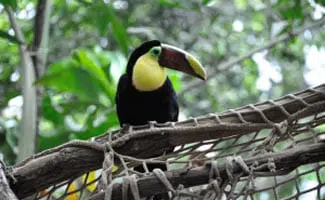When you purchase through links on our site, we may earn a commission. Here’s how it works.

The world around us is not just going to change because of global warming, it is changing right now before our very eyes – all you need to do is open them and look to see the planet peril underway. According to the United Nations, we are currently losing species at one thousand times the natural rate of extinction. That’s up to fifty thousand species of plants and animals each year.
How Many Species Are Endangered Because Of Climate Change?
According to the IUCN, climate change affects at least 10,967 species on the IUCN Red List of Threatened Species™, increasing the likelihood of their extinction.
Black Animal Markets
Dealers in countries close to eco systems that contain endangered species often get away selling rare and endangered animals as a result of difficult-to-enforce laws. Thailand’s Chatuchak market, for example, attracts buyers from around the world, and illegal wildlife trafficking in South East Asia spreads from Thailand’s forests to as far away South America and Africa.
Coronavirus
We’ve seen how the human meddling with wildlife can cause problems for humans as well, but it’s important to realize that this problem is not unique to China. Animal markets around the world not only endanger wildlife, but cause problems for human as well, as we’ve seen the past few years with the spread of COVID-19 and the loss of over 6 million lives.
Rare Animals Fetch High Premiums
Rare animals nearing extinction often fetch high prices on the black market. South American marmosets go for $2700 each, and endangered tortoises from Madagascar fetch $500 each. The Thai police works with the National Environmental Conservation Organization to help curtail dealers efforts, but they are fighting a downhill battle. Think shark fins in soup and bear paws for ash trays.
The problem doesn’t lie solely with the dealers however. There’s a reason the animal trafficking is so successful – the buyers. According to the IISD, the business is valued at up to 23 billion U.S. dollars annually, with American and China making up the top two importers of these illegal trades. What’s really sad? 90% of animals sold as exotic pets into America die before they reach their destination.
Impact On The Ecosystem
The loss of these animals doesn’t just affect their species. Entire ecosystems suffer from the loss of a species. There is no starker example of this effect than Madagascar, one of the world’s largest islands, isolated from mainland Africa for over 160 million years. Madagascar supports ninety percent of wildlife found nowhere else on the planet (since the animals can’t get off (or on) the island). Sadly, only ten percent of the natural habitat remains.
Certain animals are specific to their habitats, and have grown to survive through means dependent on their surroundings. Tree lizards, for example, have survived all this time by camouflaging themselves to look like the tree. If deforestation takes away the trees, the lizards will die out as well.
There are groups at work to protect and conserve these biodiversity hotspots. In particular, there are efforts underway to preserve the largest species of lemur, which weighs twenty pounds and can jump up to forty feet from tree to tree. These lemurs will not breed in captivity, which means if their habitat disappears, there is no way to save them.
The Land Supports More Than Just The Animals
Deforestation hurts not only the animals. It also places the entire landscape in danger, which needs the forests to provide stability for the soil, which would otherwise collapse. Every year, 350 square miles of forest are destroyed. As a result, less than 10% of Madagascar’s original habitat remains.
In Madagascar, seventy percent of natives live on less than one U.S. dollar per day. They will do anything to make a buck, and sadly, the environment ends up paying the price.
But efforts are underway to restore the landscape. The government will currently protect land where new species are found. The Madagascarian RAP (Rapid Assessment Program) goes on missions to find new species, and so far they have been quite successful. Their efforts have resulted in the protection of over 8.6 million acres of land.
Tagged With: Endangered Species